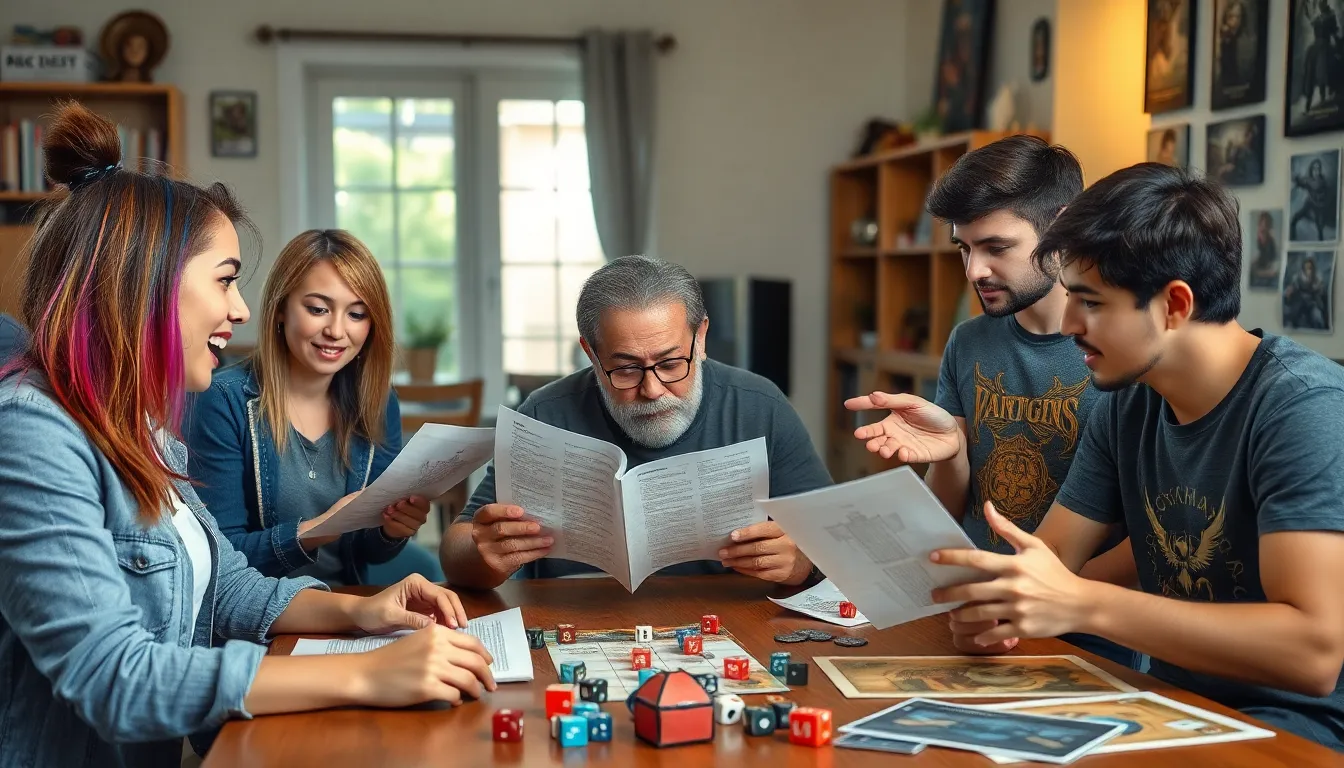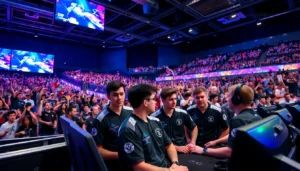Table of Contents
ToggleCreating a character in an RPG is like crafting a digital alter ego, complete with quirks, backstories, and enough charisma to charm a dragon. Whether they’re a brooding rogue or a flamboyant bard, the character you build can make or break your gaming experience. It’s not just about rolling dice and choosing stats; it’s about bringing a unique persona to life that can tackle epic quests and engage in hilarious banter with friends.
But let’s be honest: diving into character creation can feel a bit like trying to solve a Rubik’s Cube blindfolded. With countless options and complex rules, it’s easy to get overwhelmed. Fear not! This guide will help you navigate the wild world of RPG character creation, ensuring you craft a character that’s not only powerful but also as memorable as that time you accidentally set the tavern on fire.
Overview of RPG Character Creation
Character creation in RPGs encompasses multiple elements critical to a player’s journey. Players engage in defining attributes, skills, backgrounds, and appearances, each contributing to a character’s identity. Crafting a unique persona requires thoughtful consideration of various aspects, from race and class to alignment.
Selecting a race influences attributes and abilities, shaping gameplay style. For example, elves often possess increased agility, while dwarves boast higher resilience. Choosing a class determines skill sets and combat roles, impacting character functionality in encounters.
Players frequently encounter complex rules and options that can lead to confusion. To alleviate this, it’s vital to consult character creation guidelines provided in rulebooks. Utilizing these resources ensures adherence to game mechanics while allowing creativity to flourish.
Integrating a character’s backstory adds depth and narrative potential. A compelling history provides motivation for actions within the game and enhances role-playing opportunities.
Customization plays a significant role in character creation as well. Players can personalize appearances and equipment, reflecting individual tastes. Unique traits help characters stand out within their gaming groups.
Diligently considering choices during the character creation process cultivates a richer playing experience. Engaging in thoughtful deliberation leads to building powerful characters that resonate with players and enhance collective storytelling during sessions. Prioritizing enjoyment and creativity transforms character creation from a mere mechanical task into a fun and enriching activity.
Key Elements of RPG Character Creation

Character creation in RPGs centers around several fundamental aspects that shape gameplay and storytelling.
Race and Class Selection
Choosing a race impacts a character’s inherent abilities and health points. Various races such as elves, dwarves, or humans come with distinct benefits. Classes define skill sets and combat roles within the game. Each class, including warrior, mage, or rogue, offers unique abilities and strategies. Players make decisions based on their preferred playstyle. Combining race and class creates a strong character foundation and enhances role-playing experiences. Understanding race-class synergies can guide players toward optimal character builds.
Background and Personality Traits
Background influences a character’s history and motivation. Options like noble or outlander shape the character’s worldview. Personality traits contribute to individual behavior during the game. Players may select traits such as brave, cautious, or clever to reflect their character’s disposition. These elements provide depth and context, influencing interactions within the game world. Crafting a rich backstory solidifies a character’s identity and enhances narrative potential. Integrating background and personality fosters engaging role-playing opportunities.
Character Statistics and Attributes
Character statistics and attributes define a character’s core capabilities, shaping gameplay and interactions. Understanding these elements enhances character creation.
Strengths and Weaknesses
Strengths represent innate qualities that provide advantages during gameplay. A high strength score improves a character’s physical prowess, while a fortified intelligence score enhances spellcasting. Many characters exhibit unique strengths based on their race or class, like elves with dexterity or warriors with resilience. Weaknesses, on the other hand, manifest as limitations that can affect strategies. A character with low charisma might struggle during negotiations, while one with diminished wisdom may falter in decision-making. Balancing strengths and weaknesses fosters a nuanced character, encouraging more strategic gameplay and richer storytelling.
Skills and Abilities
Skills and abilities showcase what a character excels in, directly affecting their actions within the game. Common skills include stealth, perception, and persuasion, enabling characters to navigate challenges effectively. Abilities represent unique talents, like spellcasting or brute strength, providing players with distinctive gameplay options. Each class offers specific skills accessible to its members, such as a rogue’s proficiency in sleight of hand or a mage’s command over elemental magic. Prioritizing the right skills and abilities based on gameplay style elevates a character’s effectiveness, enhancing overall game experience.
Role-Playing and Story Integration
Role-playing enriches character development and enhances storytelling within RPGs. Engaging with a character’s background creates depth, motivating players to immerse themselves in the narrative. Players can craft compelling backstories, intertwining personal goals with the overarching plot.
Involvement in the game world influences a character’s actions. For instance, a noble background might drive decisions based on honor, while an outlander could prioritize survival instincts. Each choice shapes the character’s personality and interactions with others.
Player decisions not only affect in-game actions but also inspire collaborative storytelling. Characters often form alliances, sparking dynamic relationships among party members. Integrating different personality traits, such as bravery or cleverness, leads to diverse gameplay experiences, fostering richer group dynamics.
Character motivations guide actions during critical moments. Players might choose to defend loyal allies or pursue personal revenge, impacting the game’s direction. Emotional responses deepen role-play, enhancing the overall experience and engagement levels.
Additionally, integrating character stats with story elements creates a seamless connection between gameplay and narrative. A character’s strength can translate into physical challenges, while high charisma can facilitate negotiations. This synergy allows players to leverage their characters’ abilities effectively.
Beyond mechanics, the importance of role-playing lies in narrative progression. Feats of heroism or betrayal influence the story’s trajectory. Collaborating with Game Masters to weave character arcs into the main storyline provides a satisfying experience for all participants.
Fostering connections between characters enhances group interactions. Players can influence each other’s stories, as shared experiences build rapport. Such integration transforms gameplay into memorable storytelling, making every session an opportunity for growth and discovery.
Tools and Resources for Character Creation
Numerous tools and resources enhance character creation in RPGs. Online character builders simplify the process, allowing players to create detailed profiles with ease. Websites such as D&D Beyond and Roll20 offer users the ability to design characters, access rulebooks, and manage campaigns efficiently.
Character sheets remain fundamental to gameplay. Printable sheets allow players to track stats, skills, and inventory, ensuring easy reference during sessions. Many RPG systems provide official sheets, while third-party templates offer customization for unique playstyles.
Resource guides and books contribute valuable insight into character creation. Core rulebooks, like the Player’s Handbook for Dungeons & Dragons, detail races, classes, and abilities, serving as essential references. Supplementary books expand knowledge about specific classes and settings, adding depth to character options.
Community forums and social media platforms foster collaboration. Players exchange tips on character creation techniques and share their experiences, providing inspiration for new characters. Engaging with communities on Reddit or Discord helps players discover unique ideas and strategies.
Mobile applications can streamline character management. Apps like Fight Club 5th Edition allow users to create and modify characters on the go, making gameplay more accessible. Track stats, manage inventory, and consult rules directly on a device.
YouTube channels dedicated to RPG content offer tutorials and discussions that further aid character creation. Watching experienced players create and develop characters provides practical insights and ideas. Many channels focus on specific systems, ensuring relevance to the viewer’s game.
These tools and resources empower players to develop rich characters that enhance their RPG experience. Prioritizing customization ensures each character reflects personal tastes and gameplay preferences, fully engaging in the storytelling aspect of RPGs.
Character creation in RPGs is a vital aspect that shapes the overall gaming experience. By thoughtfully selecting attributes, skills, and backgrounds, players can craft unique personas that enhance storytelling and engagement. The interplay between race and class not only influences gameplay mechanics but also enriches character depth.
Utilizing available tools and resources can simplify this process, allowing players to focus on creativity and narrative. As characters evolve through shared experiences and collaborative storytelling, they become more than just game pieces; they transform into memorable figures that resonate with players and their companions. Embracing the character creation journey ultimately leads to a richer, more immersive adventure for everyone involved.




